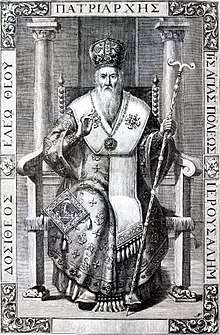Dositheos II of Jerusalem
Dositheos II Notaras of Jerusalem (Greek: Δοσίθεος Β΄ Ιεροσολύμων; Arachova 31 May 1641 – Constantinople 8 February 1707) was the Greek Orthodox Patriarch of Jerusalem between 1669 and 1707 and a theologian of the Orthodox Church. He was known for standing against influences of the Roman Catholic and Protestant Churches. He convened the Synod of Jerusalem to counter the Calvinist confessions of Cyril Lucaris.

Dositheus was born in Arachova (today the village of Exochi, Achaea) on 31 May 1641. Little of his early life is known. He was ordained a deacon in 1652 and elevated to archdeacon of Jerusalem in 1661. In 1666, he was consecrated archbishop of Caesarea Palestinae (now Ḥorbat Qesari, Israel). In 1669, he was elected patriarch of Jerusalem.
He became very involved in the state of the Orthodox Church in the Balkans, Georgia, and southern Russia, particularly after Patriarch Cyril Lucaris of Constantinople set forth in his Confession of Faith (1629) his agreement in the doctrines of predestination and justification by faith alone. In 1672, Patriarch Dositheos convened the Synod of Jerusalem that rejected all the Calvinist doctrines and reformulated Orthodox teachings in a manner that distinguished them from Roman Catholicism as well as Protestantism.
In correspondence with Peter I of Russia, he objected to Peter's reforms that subjected the Church to the state, particularly with his abolition of the Patriarchate of Moscow. Dositheos failed in his attempt to get Peter to intercede for the Orthodox Church in the peace treaty with the Ottoman Empire in 1700.
Dositheos died in Constantinople on 8 February 1707. In 1715, his twelve-volume History of the Patriarchate of Jerusalem was published.
External links
| Preceded by Nectarius |
Orthodox Patriarch of Jerusalem 1669–1707 |
Succeeded by Chrysanthus |